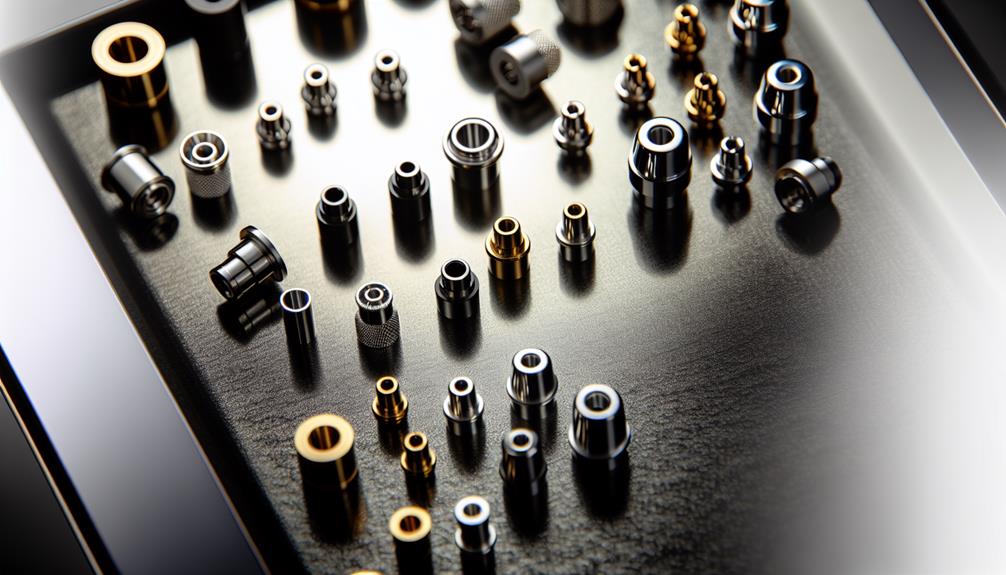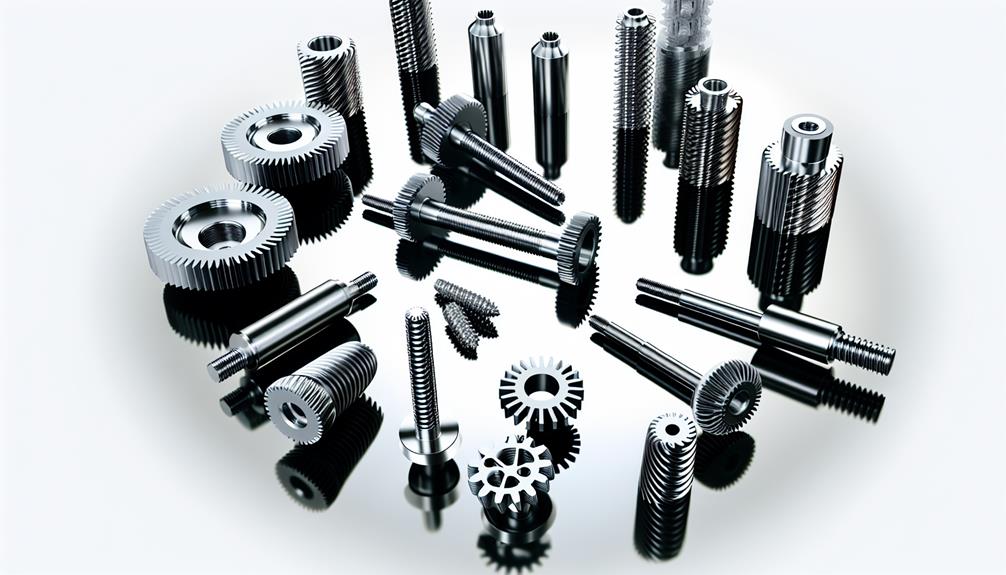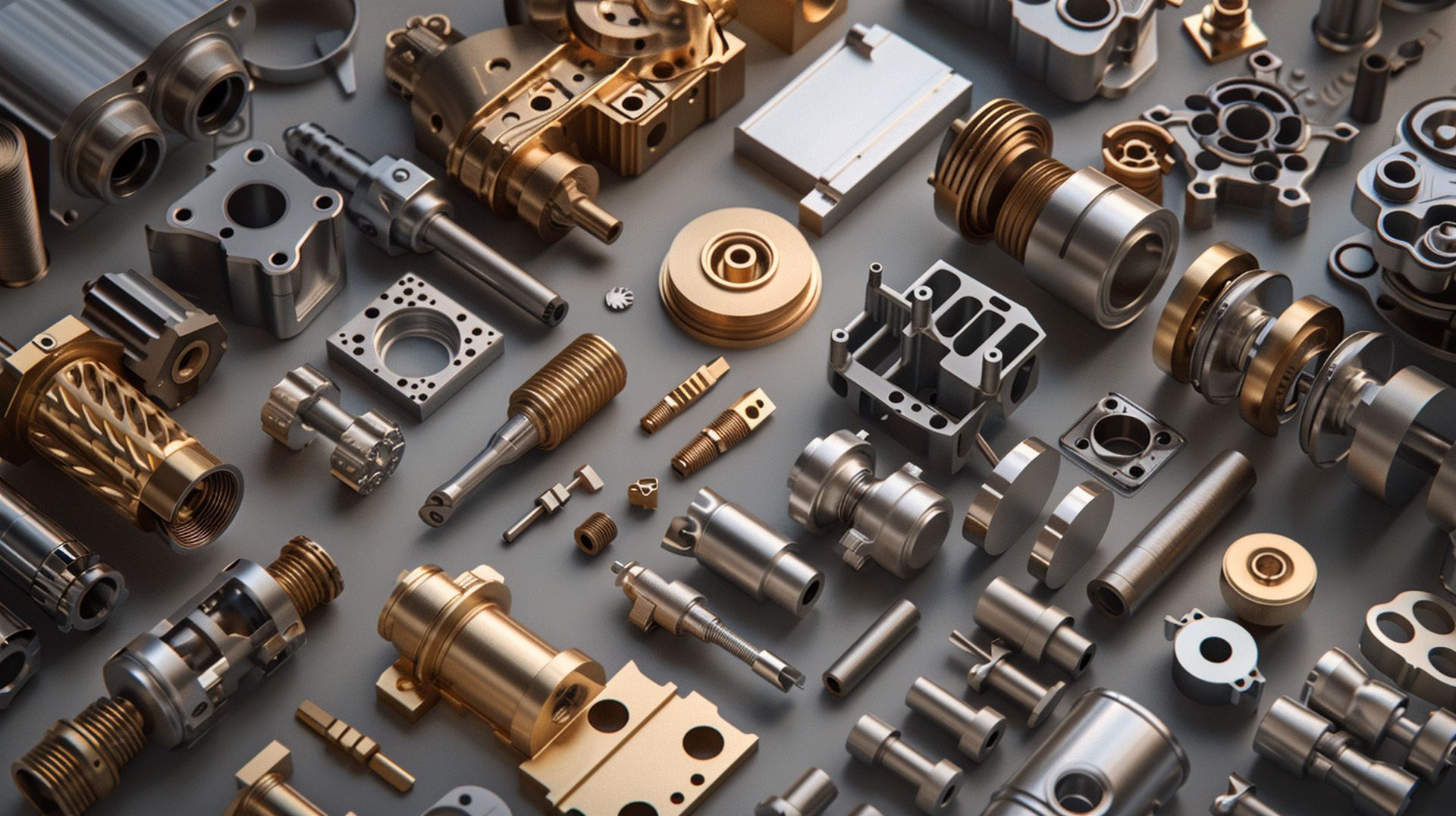Understanding Custom Shoulder Bolts: A Comprehensive Guide
Custom shoulder bolts play a crucial role in various industries, providing a secure and reliable fastening solution. However, understanding these specialized fasteners can be a complex task. That's why this comprehensive guide is here to help.
From the basics of custom shoulder bolts to their specifications and manufacturing methods, we will delve into every aspect of these essential components. Whether you are a design engineer or a procurement professional, this guide will equip you with the knowledge you need to make informed decisions and ensure optimal performance in your applications.
So, let's delve into the world of custom shoulder bolts and unlock the secrets behind their design and functionality.
Key Takeaways
- Custom shoulder bolts offer tailored solutions for various industries, providing advantages such as customization options for length, diameter, and head type.
- Precision shoulder screws are used to join components with precise alignment, utilizing the shoulder for support and accurate spacing.
- Shoulder screws are widely used in machinery, electronics, automotive, military, and precision-driven sectors, providing rotational movement and precise alignment.
- When selecting custom shoulder bolts, factors such as material selection, surface finish options, and adherence to specifications are crucial for strength, corrosion resistance, aesthetics, and overall quality control.
1. Introduction to Custom Shoulder Bolts

Custom shoulder bolts play a pivotal role in various industries, providing a reliable and efficient fastening solution that meets unique requirements and specifications. These specialized bolts offer several advantages over standard fasteners, making them a preferred choice for many applications.
One of the key advantages of custom shoulder bolts is their ability to be tailored to specific needs. From the length of the shoulder to the diameter and thread size, these bolts can be customized to fit perfectly in any given application. Additionally, customization options extend to the type of head, such as hex, square, or slotted, to further enhance the bolt's functionality.
Material selection is another critical aspect to consider when designing custom shoulder bolts. Different industries require different levels of strength, corrosion resistance, and temperature resistance. By choosing the appropriate material, such as stainless steel, alloy steel, or brass, the bolts can withstand the specific conditions they will be exposed to, ensuring long-lasting performance.
Cost considerations are also important when selecting custom shoulder bolts. While these bolts may have a higher initial cost compared to standard fasteners, their ability to provide a tailored solution often leads to cost savings in the long run. By preventing the need for additional components or modifications, custom shoulder bolts can streamline assembly processes and reduce overall production costs.
Application examples for custom shoulder bolts are vast and varied. They are commonly used in industries such as automotive, aerospace, electronics, and machinery. In automotive applications, shoulder bolts are used for engine components, suspension systems, and brake assemblies. In aerospace, they secure critical parts of aircraft structures. In electronics, these bolts are utilized in circuit boards and electrical connections. In machinery, they are found in assembly lines and heavy equipment.
2. What is a Precision Shoulder Screw?

Precision shoulder screws, also referred to as shoulder bolts, are specialized fasteners that serve the purpose of joining two components with precise alignment, building upon the concept of custom shoulder bolts discussed earlier. These screws feature a smooth, cylindrical shoulder that acts as a bearing surface, providing support and accurate spacing between the assembled parts.
One of the advantages of precision shoulder screws is their ability to maintain precise alignment, ensuring the stability and integrity of the joined components. Additionally, the shoulder provides a larger surface area for load distribution, reducing the risk of damage or deformation.
Precision shoulder screws are typically made from stainless steel, which offers excellent corrosion resistance and durability. However, they can also be manufactured from alloy steel and brass, depending on the specific application requirements.
Due to their precise dimensions, precision shoulder screws find applications in various industries, including automotive, aerospace, electronics, and manufacturing. They are commonly used in assemblies that require accurate alignment, such as precision machinery, instruments, and medical devices.
Customization options for precision shoulder screws include different shoulder lengths, thread sizes, and head styles, allowing for tailored solutions to specific applications.
Installation and maintenance of precision shoulder screws are relatively straightforward. Proper torque and thread engagement should be ensured during installation to prevent loosening or stripping. Regular inspection and maintenance are recommended to identify any signs of wear or damage, ensuring optimal performance and longevity.
3. What are Shoulder Screws Used for?

Shoulder screws are versatile fasteners that are widely used in various industries and assemblies for their ability to provide rotational movement and ensure precise alignment and load-bearing capabilities. These screws find applications in a wide range of industries, including machinery, electronics, automotive, military, and other precision-driven sectors.
Shoulder screws offer several benefits that make them ideal for these applications. Firstly, their ability to provide rotational movement allows for smooth functioning of the assembly. Secondly, their precise alignment ensures accurate positioning of components. Lastly, their load-bearing capabilities make them suitable for supporting heavy loads.
Shoulder screws can be made from various materials, including stainless steel, alloy steel, and brass. The choice of material depends on the specific requirements of the application, such as strength, corrosion resistance, and conductivity.
One of the key advantages of shoulder screws is their customization options. These screws can be manufactured in various lengths, diameters, and thread sizes to meet the specific needs of the assembly. Additionally, they can be customized with features like knurls, hex drives, or slotted drives.
The installation process for shoulder screws is relatively straightforward. They are typically installed using a hex wrench or a screwdriver, depending on the type of drive. The shoulder portion of the screw is then used to provide support and alignment to the mounted component.
4. Specifications and Dimensions of Custom Shoulder Bolts

When considering custom shoulder bolts, it is important to understand the specifications and dimensions that are available for these versatile fasteners. One of the key specifications to consider is the thread material. Custom shoulder bolts can be manufactured using various materials, including alloy steel, medium carbon steel, low carbon steel, and stainless steel in both the 300 and 400 series.
Shoulder tolerance is another important factor to consider. This refers to the allowable deviation from the specified shoulder length. Different applications may require different levels of shoulder tolerance, so it is crucial to specify the desired tolerance to ensure the shoulder bolt meets the required specifications.
The head style of the shoulder bolt is also customizable. Common head styles include hex, socket, and slotted. The choice of head style depends on the specific application and the desired functionality of the fastener.
Surface finish is another specification to consider. Custom shoulder bolts can be manufactured with a variety of surface finishes, including plain, zinc-plated, and black oxide. The choice of surface finish depends on factors such as corrosion resistance and aesthetics.
5. Manufacturing Method

The manufacturing method for custom shoulder bolts is a critical aspect of their production. The manufacturing process involves several steps, starting with material selection. The choice of material depends on factors such as the application requirements, strength, and corrosion resistance. Common materials used for custom shoulder bolts include stainless steel, alloy steel, and brass.
Cost considerations play a significant role in the manufacturing process. Different manufacturing methods have varying costs, and it is essential to strike a balance between quality and affordability. For high-volume production, methods like cold heading or screw machining may be more cost-effective, while for lower volumes, CNC machining may be preferred.
Surface finish is another important aspect of the manufacturing process. The choice of finish can impact the appearance, corrosion resistance, and functionality of the shoulder bolts. Common surface finishes for custom shoulder bolts include plain, zinc-plated, and black oxide.
Quality control is crucial at every stage of the manufacturing process. Inspections, testing, and certifications ensure that the shoulder bolts meet the required specifications and standards. This includes dimensional accuracy, strength, and surface finish.
6. Details of Custom Shoulder Bolts

When it comes to the details of custom shoulder bolts, there are several important factors to consider. These include:
- The thread size
- The shoulder diameter
- The shoulder length
- The head diameter
- The head height
Each of these elements plays a crucial role in determining the functionality and fit of the shoulder bolt. Understanding these details is essential for ensuring the proper selection and use of custom shoulder bolts in various applications.
Thread Size
Custom shoulder bolts come in a range of thread sizes to accommodate various applications and ensure a secure and precise fit. When considering the thread size for a custom shoulder bolt, several factors need to be taken into account:
- Thread pitch: This refers to the distance between the threads and determines the tightness of the connection.
- Thread diameter: The outer diameter of the threaded portion of the bolt, which must match the corresponding hole or nut size.
- Thread length: The length of the threaded portion, which should be sufficient to provide proper engagement.
- Thread material: The material used for the threads, which can vary depending on the application requirements.
- Thread finish: The surface treatment applied to the threads, such as zinc plating or black oxide coating, to enhance corrosion resistance.
Considering these factors ensures a custom shoulder bolt with the right thread size for a specific application, resulting in a secure and precise fit.
Shoulder Diameter
With various aspects to consider when choosing the appropriate thread size, it is essential to now delve into the shoulder diameter, an integral detail of custom shoulder bolts.
The shoulder diameter refers to the width of the shoulder portion of the bolt, which is the area between the head and the threaded section. It plays a crucial role in determining the strength and stability of the shoulder bolt.
The shoulder diameter can vary based on the specific application requirements and the materials used for the shoulder bolt. Customization options for shoulder diameter allow for a precise fit and optimal performance in various applications.
Shoulder Length
The shoulder length of a custom shoulder bolt is a critical aspect that directly affects its functionality and compatibility with specific applications. When considering the shoulder length of a custom shoulder bolt, several factors need to be taken into account.
Here are some key discussion ideas about shoulder length:
- Importance of proper shoulder length in custom shoulder bolts:
- Proper shoulder length ensures the bolt fits securely in the application.
- It helps distribute the load evenly, reducing stress concentration.
- Factors to consider when determining shoulder length:
- The thickness of the material being fastened.
- The desired amount of thread engagement.
- The specific application requirements.
- Effects of varying shoulder length on bolt performance:
- A longer shoulder length increases the weight-bearing capacity.
- A shorter shoulder length may result in reduced strength and stability.
Avoiding common mistakes when measuring shoulder length is crucial to achieve optimal bolt performance. Customizing the shoulder length for specific applications ensures a perfect fit and enhances overall functionality.
Head Diameter
When considering the details of custom shoulder bolts, one crucial aspect to examine is the head diameter.
The head diameter of a shoulder bolt refers to the width of the head, which can vary depending on the specific requirements of the application. The head diameter is typically determined by factors such as the load-bearing capacity needed and the desired aesthetic appearance.
Additionally, the head diameter can also impact the overall strength and stability of the bolt. It is important to choose the appropriate head material, shape, style, and finish to ensure optimal performance and durability.
The head material should be selected based on the application's requirements for strength, corrosion resistance, and temperature resistance. The head shape and style can contribute to the functionality and appearance of the shoulder bolt, while the head finish can provide additional protection against corrosion and enhance the overall aesthetic appeal.
Head Height
The measurement that plays a significant role in the design and function of custom shoulder bolts is the head height. This measurement refers to the distance from the bottom of the head to the bearing surface of the bolt. The head height of custom shoulder bolts can vary depending on the specific requirements of the application.
Here are three key factors to consider when it comes to head height:
- Head shape: The shape of the head can affect the overall height of the bolt. Different head shapes, such as round, hex, or square, may have different height requirements.
- Head material: The material used for the head can also impact the head height. Different materials have different densities and strengths, which can result in variations in head height.
- Head style and finish: The style and finish of the head can also affect the overall height of the bolt. For example, a flanged head or a recessed head may have different height requirements.
Considering these factors is crucial when designing custom shoulder bolts to ensure optimal performance and functionality.
Head Texture
To enhance grip and provide a tactile surface, custom shoulder bolts can be manufactured with either a knurled or smooth head texture. The choice between knurled and smooth head bolts depends on the specific application and the desired functionality.
Knurled head bolts have a textured surface that offers several benefits. The knurled texture improves grip, making it easier to tighten and loosen the bolt without slipping. This is particularly advantageous in applications where the bolt is frequently adjusted or requires a strong grip. Knurled head bolts are commonly used in industries such as automotive, aerospace, and machinery.
On the other hand, smooth head bolts have their own advantages. The smooth surface allows for easy cleaning and prevents dirt and debris from getting trapped, reducing the risk of corrosion and damage. Smooth head bolts are often used in applications where aesthetics and cleanliness are important, such as in the furniture or electronics industry.
In summary, the choice between knurled and smooth head bolts depends on the specific needs of the application. Knurled head bolts provide enhanced grip and are commonly used in industries where a strong grip is required. Smooth head bolts, on the other hand, offer easy cleaning and are often used in applications where aesthetics and cleanliness are important.
| Knurled Head Bolts | Smooth Head Bolts |
|---|---|
| Enhanced grip | Easy cleaning |
| Suitable for frequent adjustments | Prevents dirt and debris accumulation |
| Commonly used in automotive, aerospace, and machinery industry | Ideal for furniture and electronics industry |
This table provides a quick comparison between knurled and smooth head bolts, highlighting their respective benefits and applications.
Thread Pitch
Custom shoulder bolts have a specific thread pitch that determines the distance between each thread and plays a crucial role in the functionality and compatibility of the bolt with other components. The thread pitch refers to the number of threads per inch or millimeter.
Here are three important aspects related to thread pitch:
- Thread form: The shape and angle of the thread profile, such as square, triangular, or V-shaped, which can vary depending on the application.
- Thread gauge: A tool used for measuring the thread pitch accurately, ensuring compliance with the required standards.
- Thread standards: Various organizations, such as ANSI, ISO, and DIN, establish standard thread pitch specifications to ensure uniformity and interchangeability.
- Thread measurement: Thread pitch can be measured using pitch gauges, thread micrometers, or thread measuring wires to ensure accuracy and precision.
Understanding thread pitch is essential for selecting the right custom shoulder bolt that fits seamlessly into your application.
Drive Size
When considering the details of custom shoulder bolts, one important aspect to consider is the drive size.
The drive size refers to the size and shape of the socket or driver used to tighten or loosen the bolt. It plays a crucial role in determining the torque capacity and the ease of installation or removal of the bolt.
The most common drive sizes for shoulder bolts are hexagonal (hex) and square drives. Hexagonal drive shoulder bolts offer good torque capacity and are widely used in various applications. On the other hand, square drive shoulder bolts provide enhanced impact resistance and are favored in high-stress environments.
Choosing the appropriate drive size ensures proper engagement with the tool and facilitates efficient assembly or disassembly operations.
Thread Type
The thread type is an essential feature to consider when examining the details of custom shoulder bolts. It determines the thread compatibility, ensuring that the bolt can securely engage with the mating threads in the application. Here are three important aspects to consider regarding thread type:
- Thread Standards: Custom shoulder bolts can be manufactured with various thread standards, such as UNC (Unified National Coarse) or UNF (Unified National Fine). Understanding the specific thread standard required for your application is crucial for achieving proper thread engagement.
- Thread Selection: Depending on the application requirements, you may need to select between internal threads, external threads, or a combination of both. It's important to choose the appropriate thread type to ensure compatibility and reliable performance.
- Thread Strength: The thread type also plays a role in determining the overall thread strength of the custom shoulder bolt. Different thread types have varying levels of resistance to shear forces, which is an important consideration for applications with high loads or vibrations.
Thread Fit
What factors should be considered when determining the thread fit for custom shoulder bolts? The thread fit of a shoulder bolt refers to how tightly the threads of the bolt engage with the corresponding threads in the mating part. It is crucial to choose the right thread fit to ensure the proper functioning and longevity of the assembly. Several factors should be taken into account, including thread tolerance, thread engagement, thread galling, thread stripping, and thread lubrication. To help you understand these factors, refer to the table below:
| Factor | Description |
|---|---|
| Thread Tolerance | The allowable variation in the thread dimensions. |
| Thread Engagement | The amount of thread contact between the bolt and the mating part. |
| Thread Galling | The tendency for the threads to seize or gall due to friction during assembly or operation. |
| Thread Stripping | The risk of damaging or stripping the threads during installation or removal. |
| Thread Lubrication | The use of lubrication to reduce friction and prevent galling and stripping of the threads. |
Consider these factors carefully to select the appropriate thread fit for your custom shoulder bolts, ensuring optimal performance and reliability.
Frequently Asked Questions
How Do I Determine the Right Size of Custom Shoulder Bolt for My Application?
To determine the right size of a custom shoulder bolt for your application, factors affecting load capacity, measuring required shoulder length, considering thread length, and the role of shoulder diameter must be considered. Consulting with a manufacturer ensures accuracy.
Can Custom Shoulder Bolts Be Used in High-Temperature Environments?
When considering the use of custom shoulder bolts in high-temperature environments, it is crucial to assess their thermal performance, material compatibility, heat resistance, and temperature limits. These factors ensure their suitability for high-temperature applications.
Are There Any Specific Finishes or Coatings Available for Custom Shoulder Bolts?
There are various types of finishes and coatings available for custom shoulder bolts, which play a crucial role in enhancing their durability. Commonly used coatings in industrial applications include zinc plating, nickel plating, and powder coating. Factors to consider when choosing the right finish include corrosion resistance, aesthetics, and cost. Each finish or coating has its own pros and cons, so it is important to carefully evaluate the specific requirements of the application.
Is It Possible to Order Custom Shoulder Bolts With Specific Thread Types or Pitches?
Yes, it is possible to order custom shoulder bolts with specific thread types or pitches. This allows for greater flexibility and precision in various applications across industries, enhancing the benefits and functionality of using custom shoulder bolts.
Can Custom Shoulder Bolts Be Made From Different Materials, Such as Stainless Steel or Brass?
Yes, custom shoulder bolts can be made from a variety of materials including stainless steel and brass. Stainless steel offers advantages such as corrosion resistance, while brass provides benefits like electrical conductivity. Factors to consider when choosing the material include strength, cost, and application requirements.
Mikehardware-your trusted custom bolts manufacturer
In conclusion, custom shoulder bolts are versatile fasteners widely used in various industries for their precision and durability. They offer a reliable solution for applications requiring a secure and adjustable connection.
While some may argue that custom shoulder bolts are costly compared to standard fasteners, their unique specifications and dimensions make them a valuable investment for specific projects where precision and performance are crucial.
At Dongguan Mike Hardware Co., Ltd., precision engineering meets innovation, delivering impeccable CNC product manufacturing solutions. Explore our array of customized fasteners, screws, and coatings, ensuring your projects excel in performance, precision, and quality.
Elevate your engineering prowess with our tailored solutions—Contact us for a free quote of your ideal custom bolts.




